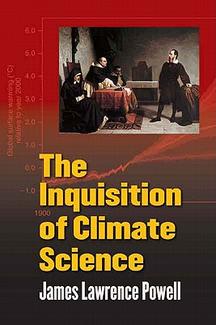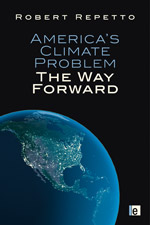 “…in the denial of global warming, we are witnessing the most vicious, and so far most successful, attack on science in history.” Those strong words are from James Lawrence Powell in his recent book The Inquisition of Climate Science. The book chronicles the campaign of denial which has resulted in the widespread failure of public understanding of climate science and the long delay in addressing what is now an urgent and pressing threat to the human future.
“…in the denial of global warming, we are witnessing the most vicious, and so far most successful, attack on science in history.” Those strong words are from James Lawrence Powell in his recent book The Inquisition of Climate Science. The book chronicles the campaign of denial which has resulted in the widespread failure of public understanding of climate science and the long delay in addressing what is now an urgent and pressing threat to the human future.
Powell, a former geology professor, college president and museum director who also served as a member of the US National Science Board for twelve years, is rightly disturbed at the treatment meted out to climate science. The evidence of global warming has accumulated over the past twenty years until it has become overwhelming. Yet climate scientists have been denounced and ridiculed, their ethics and honesty have been questioned, and Congressional committees have subjected them to Kafkaesque interrogation. A sustained attempt has been made to attempt to neutralise a whole field of science. Science denial is so widespread that “reason itself is threatened”. Continue reading “The Inquisition of Climate Science”

 America is much better in technology than governance. That’s the sentence that leapt out at me and remained prominent throughout my reading of economist Robert Repetto’s book America’s Climate Problem: The Way Forward. I sought the book for review because, although its focus is on the US, what happens there will crucially affect the rest of us, in terms of both the level of greenhouse gas concentrations in the atmosphere and the likelihood of international agreement to limit them. The book doesn’t exactly inspire hope on either count, but it is constructive in the path it suggests for the US to follow and puts the ball squarely in the court of the policy makers.
America is much better in technology than governance. That’s the sentence that leapt out at me and remained prominent throughout my reading of economist Robert Repetto’s book America’s Climate Problem: The Way Forward. I sought the book for review because, although its focus is on the US, what happens there will crucially affect the rest of us, in terms of both the level of greenhouse gas concentrations in the atmosphere and the likelihood of international agreement to limit them. The book doesn’t exactly inspire hope on either count, but it is constructive in the path it suggests for the US to follow and puts the ball squarely in the court of the policy makers.